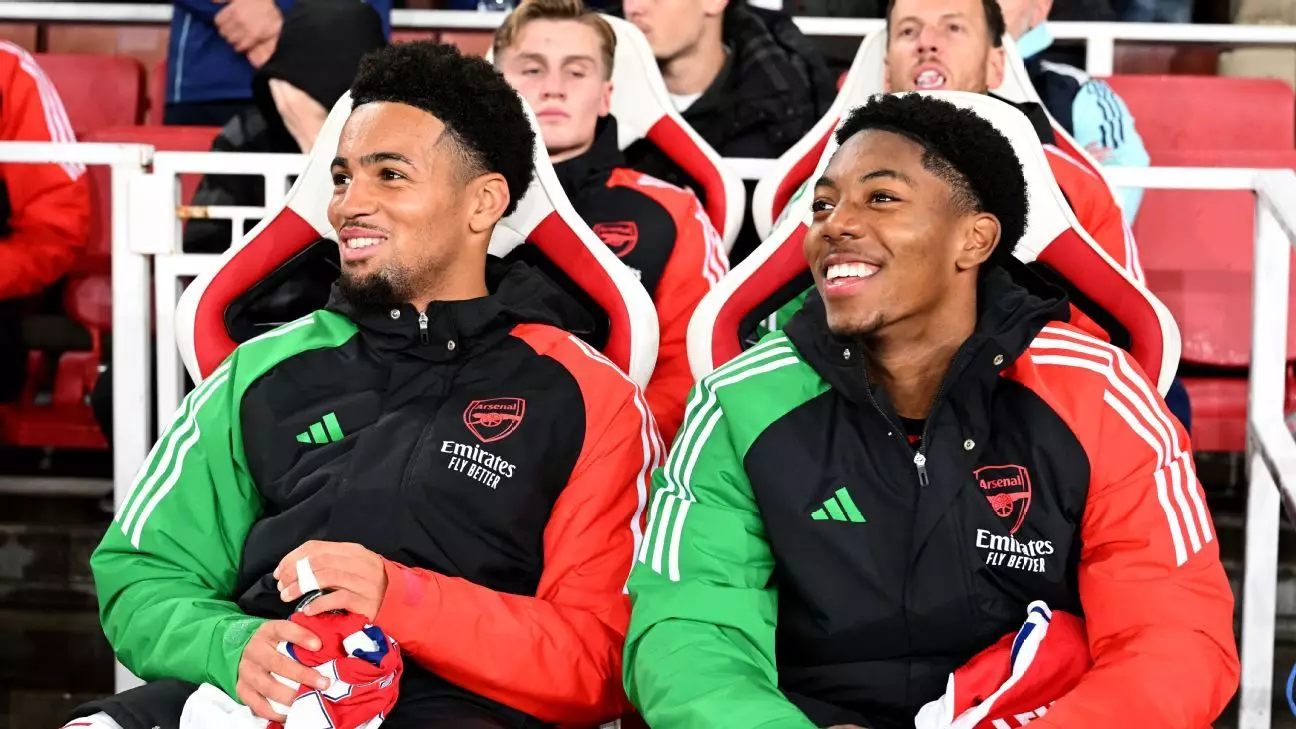Arsenal FC, a club known for its rich history and commitment to developing young talent, finds itself in an intriguing phase this season. With a deliberately smaller squad, manager Mikel Arteta has leaned into the club’s youth academy more than ever, especially as injuries have sidelined several key players. The confluence of necessity and opportunity has opened the doors for young prospects to step up, showcasing their skills and potential on the Premier League stage.
As Arsenal navigates the early season, injuries to pivotal players such as Martin Ødegaard and Gabriel Magalhães have raised concerns about squad depth. With the pressure mounting, Arteta has turned towards youth-team players for support. It’s not just a stop-gap measure; this is a calculated gamble that reflects a belief in the academy’s capabilities. As the fixture list intensifies—highlighted by upcoming matches like the Carabao Cup clash against Preston—the question arises: which young prospects are poised to make their mark in the top flight?
Among the emerging stars, the 19-year-old Lewis-Skelly has stood out as a multifaceted player. Arteta’s trust in him is evident, as Lewis-Skelly has already participated in several competitions, demonstrating adaptability across various positions. Whether playing as a holding midfielder or filling in at left-back, the England U19 international exhibits a rare maturity for his age. His ability to read the game, combined with technical skills like dribbling and ball shielding, suggests that he could be a key figure for Arsenal in the near future. It remains to be seen whether further positional clarity will emerge, but his current trajectory points towards a promising career with the Gunners.
Another name worth mentioning is Kabia, an 18-year-old talent who, despite struggling with injuries, has emerged as a dynamic contributor in the under-21 setup. His physical attributes, especially incredible acceleration from a standstill, set him apart as a winger capable of explosive impacts in matches. While his technical skills need refinement, particularly concerning upper-body strength, his tactical awareness positions him as a player who may soon showcase his abilities in the Premier League. The upcoming fixtures provide a perfect opportunity for Arteta to assess his readiness against seasoned opponents.
Heaven, originally a midfielder, represents a fascinating case of positional evolution. With a strong background in central roles, his transition towards defense could contribute significantly to Arsenal’s early-season challenges. While he possesses excellent technical abilities and a good distribution, there are concerns regarding his tendency to be overly casual on the ball. For Heaven, prioritizing urgency and increasing confidence in his right foot could be vital to establishing himself in the starting XI. As teammate and competition rear up, the pressure is on for him to adapt successfully.
Kacurri: The Throwback Center-Back
There’s something refreshing about the 19-year-old Kacurri, recognized for his commitment and aggressive style. In an era dominated by ball-playing defenders, his traditional centre-back qualities are reminiscent of football’s earlier days. Tackles are executed with authority, and his pace allows him to recover rapidly, crucial against rapid counter-attacking teams. Despite fierce competition in the defensive lineup, Kacurri’s impressive performances in cup matches hint at a bright future ahead, particularly given his recent selection for the Albania U21 squad.
Nichols, another homegrown talent, brings versatility to the right-back position. Having transitioned from being a forward, he infuses his play with attacking instincts. His performances highlight an exciting balance of offensive and defensive responsibilities; with continued development, a loan spell could catalyze his progression into a formidable first-team player.
On the contrary, in an extraordinary achievement, Porter made headlines by becoming the youngest-ever starter for Arsenal at just 16. His rise through the ranks is commendable, and his command over the ball and agile reflexes indicate that the future of goalkeeping at Arsenal might be in good hands. As he gains experience, refining his play with both feet will amplify his effectiveness, particularly in high-stakes situations.
Arsenal’s pathway of integrating youth into the first team not only addresses short-term deficiencies due to injuries but also cultivates long-term potential. The abovementioned players, each with their unique skills and growth trajectories, signify hope within the club’s storied tradition of nurturing talent. In a demanding environment, where anticipation runs high, the challenges ahead will undoubtedly test these young guns. However, with their current potential on display, Arsenal fans have every reason to remain optimistic. The arrival of youth in the senior squad not only fulfills immediate needs but also paves the way for a promising era at the Emirates.

